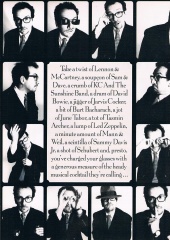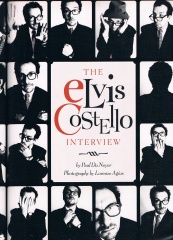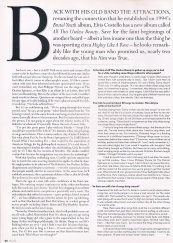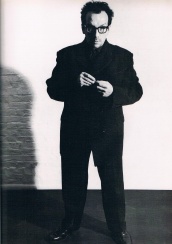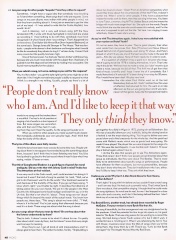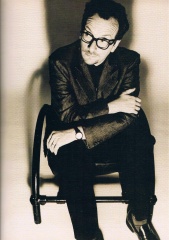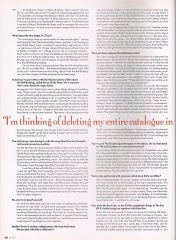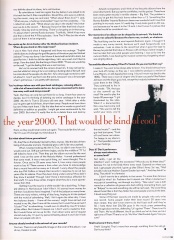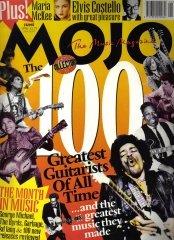Mojo, June 1996: Difference between revisions
(+text part 2) |
(+text part 3) |
||
| Line 47: | Line 47: | ||
I will record those other songs, but I've got some arrangements of them which are not like anything else I've ever recorded. I want to do them properly. I'll take time to learn what I need to learn. | I will record those other songs, but I've got some arrangements of them which are not like anything else I've ever recorded. I want to do them properly. I'll take time to learn what I need to learn. | ||
''Are your songs for other people "bespoke"? Are they written to request? | |||
Sometimes. I might have a vague idea that somebody was recording so I'd send them something. Most songs that I write are requests. Some songs on my past albums were written with other people in mind, not that they knew anything about it. It was just an exercise to get the idea out of my head - if I was asked to write this for Curtis Mayfield, how would I do it? | |||
"Just A Memory," not a very well known song [off the New Amsterdam EP], I wrote with Dusty Springfield in mind and she ended up recording it. I had nothing to do with that, somebody must have recognised in it what I heard when I was writing it. That's happened two or three times: Chet Baker did "Almost Blue" [from Imperial Bedroom] on the some basis. George Jones did "Stranger In The House." That was fantastic - people write demos in their bedroom and imagine what it would be like for somebody they admire to sing it. I've been lucky. I haven't had many covers but the quality has been high. | |||
One of the best covers I've had was Tasmin Archer's "All Grown Up," because she was much more tender with the subject than I had been. I'd pushed it over the edge and lost intensity by making it too accusative. She found more sympathy for the subject. | |||
''When you submit a song, is it nerve-racking as you wait for the response? | |||
Yes, it is like a tailor - you get the style right but the arms might be on the short side. I find I might over-estimate people's ability to respond to what I think is a strength in my writing. Usually, people say there's a lot of words in my songs and that makes them a mouthful. I've had a lot of practice at singing a lot of words in a short space of time. But some singers are uncomfortable with that and if they feel it's rushing them they won't hear the quality. So the song can founder on it. | |||
When you write for other people you make yourself much clearer. Not everybody understands your own peculiar logic. And I think that helps the clarity of this album. | |||
''The lyrics of this album seem fairly concise. | |||
I think the lyrics have been more concise for some time now. People writing about them in newspapers have tended to soy the same things about them, because I don't think they've been listening very hard. You'd be hard pushed to go back to the last record where it wasn't clear what I was saying, maybe 10 years or more. | |||
''The title of "Complicated Shadows" is a good figure of speech for moral ambiguity. Did you write that with Johnny Cash in mind? It also has The Attractions at their noisiest. | |||
It was very much in the Cash mould, and I could envision him doing it. It turned out it wasn't the kind of song he wanted. So I said, "Well, we've got to do it because I want to do the words." Our treatment seemed to work because of the brutality of the idea. If you go out there saying, "I know what's right," you'd better be right. It describes that dilemma of taking justice into your own hands. We see it in the people in the West Country who kidnapped some local hooligan and beat him up, or in the LA riots. But that's not what it's 'about'. These songs are not 'about' things which lie beyond the reach of the actual words. You know how people say, these days, "This song is about my inner child..."? Well, where is it in the text? You're just saying that afterwards because you read it in a book. These songs are about what the song is about. | |||
''Are your songs about what you mean by them? Or are they about what the listener understands by them? | |||
They're both. It doesn't cease to be what it's about for me. I'm pretty clear about what I mean by them, but that doesn't mean that every single word conveys its meaning. | |||
Once they're out, I get all kinds of wild interpretations and I'm always glad to hear them. The wilder the better, frankly. "Shipbuilding is about two lovers in a boat." Great! From an American perspective, what would they know about the circumstances of that text? Fine, it doesn't bother me. When I write for other people, if they have a picture that makes the words work for them, then they can sing it that way. You listen to June Tabor, a woman, sing "All This Useless Beauty" and she invests the bridge with much more anger than I do. She spits out the words. People would think she was the one who could caress this melody, and I'm the one who's supposed to spit out the bile. Yet here I am singing it more reflectively. Doesn't mean she's wrong. | |||
''As you're with The Attractions again, I take it you were satisfied with your reunion on ''Brutal Youth''? | |||
It's not an exam they have to pass. They're great players, their other work aside from me proves that. Pete [Thomas] and Steve [Nieve] played behind a lot of good people, even doing TV shows. And Pete's played on what I'd say was one of the best records mode in the post 20 years - Kiko [by Los Lobos]. None of them needs me in order to work. | |||
It's a question of whether it has a spark to it. Anyone who imagines it's going to be like 1978 is kidding themselves. It isn't. That's the way it should be. We know how to make a noise, but I don't want to just make a noise, because we did all that. The thrill we all get from that kind of music is terrific and I hope I never tire of it completely. But I would have tired of it seriously if I'd been doing it non-stop for 20 years. Plus I would have been deaf. We play very loud. | |||
I remember the vibe when Paul Weller went on at the lost Glastonbury that we did. I hadn't realised how this wave of affection had returned for him. He went on in late afternoon as the sun was going down and it was reminiscent of that genial, fuzzy vibe that people had tried to get together for a field in Wigan in 1972, pissing rain at Bickershaw. But this was a beautiful afternoon and, truthfully, being the closing band at a festival is not the most relaxing thing. You've got to deliver your own paced show and a final crescendo for the whole day. And the peak had come with Weller's music which was so genial and easy-going. We needn't have played. We played like we were strapped to the wings of a 747. We were like Led Zeppelin. It was horrible and I hated it. I'll never play a festival again unless I have to. | |||
I do like the idea that people got to see The Attractions again. Those that cared. I don't think most people are sentimental about that group as individuals, like they were about The Beatles. They're more likely to be sentimental about specific songs or performances. People have affection for them as players, but not as personalities, because they don't know who they are. They don't really know who I am, either. And I'd like to keep it that way. They only think they know. | |||
''I believe you wrote "Why Can't A Man Stand Alone" for Sam Moore, of Sam & Dave? | |||
That's right. I'd sung with him before and you couldn't hear a note I sang - and I am very loud. He had such a powerful voice. That's what Sam & Dave was about, that competitive singing. I thought that he could make the song righteous. Its words are for real, for me. I feel trapped in a class and a skin and a country, and I don't like being defined like that. I don't think any of us are any the better for it. | |||
''"You Bowed Down," another track, has already been recorded by Roger McGuinn. Yet your version is more Byrds-like than his. | |||
He sang it beautifully, but the arrangement was very straightened out by the producer. It had the potential for him to go into space on, his great talent in The Byrds. That was a big reason for me wanting to re-record the song. We tried doing a Sonic Youth version of it, but it didn't work, it wanted to have a 12-string on it. When I was rehearsing ''My Aim Is True'' with Clover, musicians never know the titles of songs when you're first doing them, they know them by a riff. They'd soy, "Let's do that Byrds one again" for "The Angels Wanna Wear My Red Shoes." | |||
Revision as of 12:37, 29 April 2013
|
